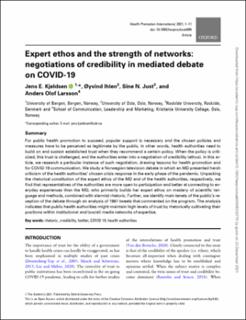| dc.contributor.author | Kjeldsen, Jens Elmelund | |
| dc.contributor.author | Ihlen, Øyvind | |
| dc.contributor.author | Just, Sine Nørholm | |
| dc.contributor.author | Larsson, Anders Olof | |
| dc.date.accessioned | 2022-12-15T13:09:03Z | |
| dc.date.available | 2022-12-15T13:09:03Z | |
| dc.date.created | 2021-08-04T08:55:17Z | |
| dc.date.issued | 2022 | |
| dc.identifier.citation | Health Promotion International. 2022, 37(2). | en_US |
| dc.identifier.issn | 0957-4824 | |
| dc.identifier.uri | https://hdl.handle.net/11250/3038035 | |
| dc.description.abstract | For public health promotion to succeed, popular support is necessary and the chosen policies and measures have to be perceived as legitimate by the public. In other words, health authorities need to build on and sustain established trust when they recommend a certain policy. When the policy is criticized, this trust is challenged, and the authorities enter into a negotiation of credibility (ethos). In this article, we research a particular instance of such negotiation, drawing lessons for health promotion and for COVID-19 communication.We study a Norwegian television debate in which an MD presented harsh criticism of the health authorities’ chosen crisis response in the early phase of the pandemic. Unpacking the rhetorical constitution of the expert ethos of the MD and of the health authorities, respectively, we find that representatives of the authorities are more open to participation and better at connecting to everyday experiences than the MD, who primarily builds her expert ethos on mastery of scientific language and methods, combined with alarmist rhetoric. Further, we identify main tenets of the public’s reception of the debate through an analysis of 1961 tweets that commented on the program. The analysis indicates that public health authorities might maintain high levels of trust by rhetorically cultivating their positions within institutional and (social) media networks of expertise. | en_US |
| dc.language.iso | eng | en_US |
| dc.relation.uri | https://academic.oup.com/heapro/advance-article/doi/10.1093/heapro/daab095/6335776?guestAccessKey=c35bb0a1-94a2-4950-8765-7c978a0b7114 | |
| dc.rights | Navngivelse 4.0 Internasjonal | * |
| dc.rights.uri | http://creativecommons.org/licenses/by/4.0/deed.no | * |
| dc.title | Expert ethos and the strength of networks: negotiations of credibility in mediated debate on COVID-19 | en_US |
| dc.type | Peer reviewed | en_US |
| dc.type | Journal article | en_US |
| dc.description.version | publishedVersion | en_US |
| dc.source.pagenumber | 11. | en_US |
| dc.source.volume | 37 | en_US |
| dc.source.journal | Health Promotion International | en_US |
| dc.source.issue | 2 | en_US |
| dc.identifier.doi | 10.1093/heapro/daab095 | |
| dc.identifier.cristin | 1923752 | |
| dc.relation.project | Norges forskningsråd: 296347 | en_US |
| cristin.ispublished | true | |
| cristin.fulltext | original | |
| cristin.qualitycode | 1 | |

